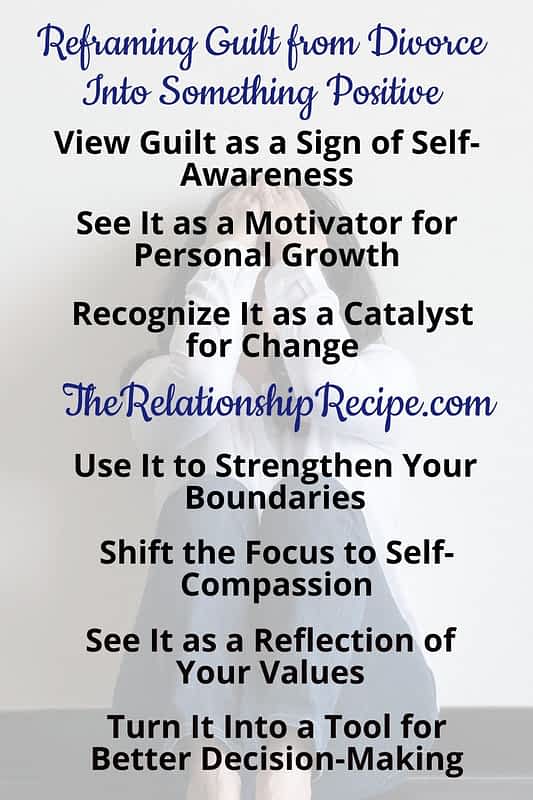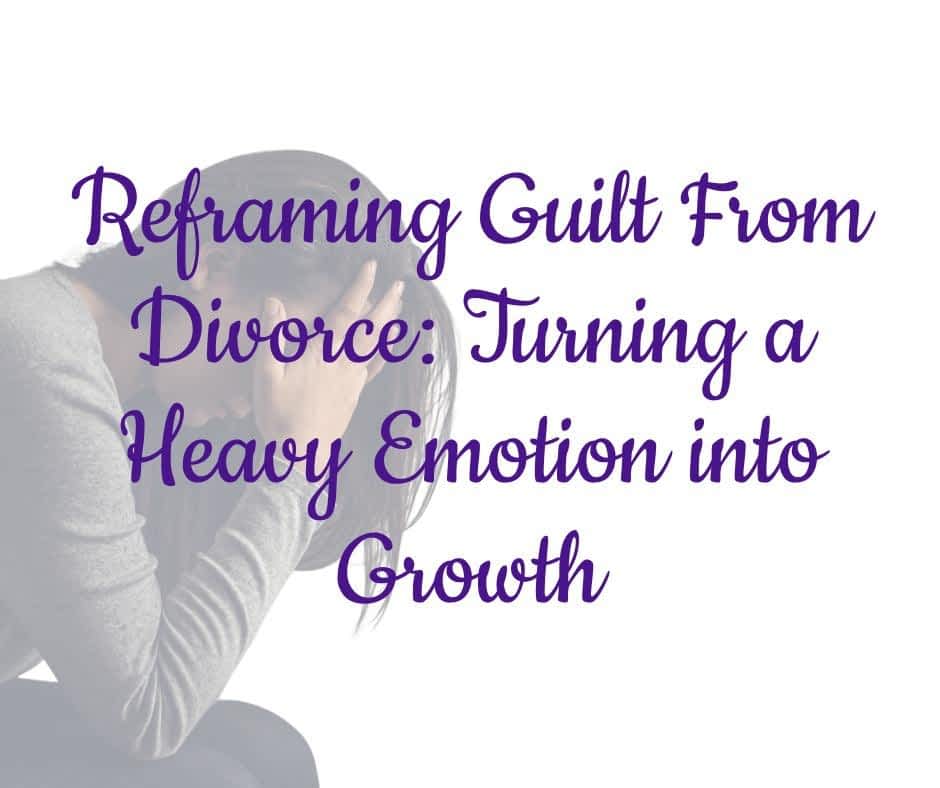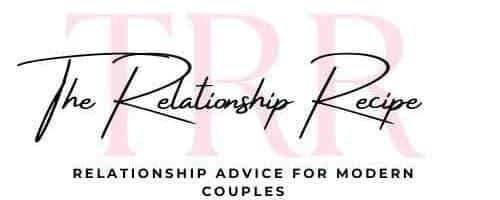Reframing Guilt From Divorce: Turn Divorce Shame into Growth
Nearly everyone who’s been through it knows the spirit-crushing gut-punch of divorce guilt. It can feel like it’s out to flatten your spirit and leave you stuck in regret. This isn’t about pretending it’s not there, because you will feel it.
So how can reframing guilt from divorce actually fuel something good? What if shifting to a different perspective on divorce guilt could turn that heavy shame into growth after a marriage ending instead of self-sabotage?
I’m a firm believer in the power of positive thinking, not the corny, plaster-a-smile-on kind, but the real work of channeling raw emotions into something productive.
The truth is, avoiding these uncomfortable feelings isn’t an option, and it shouldn’t be. Let yourself sit with those kind of feelings. They’re part of the process of becoming stronger.
When your marriage ends, and your life feels like a giant question mark, you have a rare chance. You can use that guilt as a catalyst for growth after a marriage ending. You can turn it into your comeback story. That’s what this journey is about; figuring out how to turn divorce shame into growth that actually matters..
Personal growth is one of the best things to come from divorce. Think of it as a gift. 🎁

💡Key Highlights: Reframing Guilt From Divorce
- Why guilt after divorce isn’t necessarily a bad thing, but a sign of something deeper.
- The surprising way guilt can actually help you grow (if you let it).
- How to turn guilt from a roadblock into a powerful motivator for change.
- The hidden connection between guilt and your personal values: what it really says about you.
- A mindset shift that transforms guilt into self-compassion instead of self-punishment.
- The unexpected role guilt plays in boundary-setting (and why it matters more than you think).
- How to use guilt as a tool for making better decisions without staying stuck in the past.
- Why guilt is just a phase of healing and not your permanent emotional state.
🚀 Stay with me. This might just change the way you see everything! 🚀

Reframing Guilt From Divorce: What If That Shame Could Be Your Secret Superpower?
Reframing guilt from divorce can feel like hauling around a cinder block strapped to your chest. But instead of treating it like proof you’ve failed at life, you can see it for what it really is – a natural part of healing and making positive changes. When you shift to a different perspective on divorce guilt, is stops being dead weight and starts becoming a surprising source of self-awareness and growth after a marriage ending.
Here’s how:
💡View Guilt as a Sign of Self-Awareness
Instead of treating guilt from divorce like emotional baggage you’re stuck dragging around, try seeing it for what it really is: proof that you give a damn. It means you cared: about your choices, about the people involved, and about the impact of it all. That’s not weakness. That’s emotional depth.
Reframing guilt from divorce this way turns it into a kind of emotional intelligence. It’s a sign that you’re capable of self-awareness and reflection – skills that way too many people skip out on. And guess what? That depth – it’s yours. No one can take it from you. So instead of drowning in guilt, recognize it as a strength you can actually build from.

💡See It as a Motivator for Personal Growth
Don’t let guilt from divorce trap you in a loop of regret. Flip the script to a new different perspective on divorce guilt – one that will encourage personal growth after a marriage ending. Guilt, annoying as it is, actually points to the places where you want to grow. Maybe it’s emotional healing, better boundaries, or finally breaking some old patterns that never served you.
Reframing guilt from divorce helps shift the focus from beating yourself up to actually moving forward. It’s not punishment – it’s progress.
💡Recognize It as a Catalyst for Change
Divorce is a massive life upheaval, and guilt is often just your brain’s way of waving a flag that you’re in the middle of a transition. Instead of obsessing over everything that went wrong, let that guilt nudge you toward something better: a healthier, happier future. See it for what it is, as part of your growth and proof that you’re evolving into a stronger, more self-aware version of yourself.

💡Use It to Strengthen Your Boundaries
Guilt has a sneaky way of creeping in when you finally put your own well-being ahead of everyone else’s expectations. Reframing guilt from divorce means recognizing it as your chance to set (and actually stick to) healthy boundaries. You can still care about other people without letting guilt run the show. Honoring your own emotional needs doesn’t make you selfish; it makes you sane.
💡Shift the Focus to Self-Compassion
One of the most powerful ways to reframe guilt from divorce is to start treating yourself like you would a close friend. Seriously, if your best friend were going through this, you wouldn’t be dragging them through the mud. You’d offer compassion, patience, and a whole lot of grace.
Divorce is messy. It’s hard. You’re allowed to feel all the things, but instead of using guilt as ammo to beat yourself up, let it be a reminder to show yourself some damn kindness. You deserve that.

💡See It as a Reflection of Your Values
Feeling guilty after divorce usually just means you take commitment and loyalty seriously. And that’s nothing to be ashamed of. But let’s be clear: choosing to leave a marriage doesn’t mean you’ve thrown those values out the window. It means you’re finally making a choice that respects your own well-being.
By reframing guilt from divorce, you can see that staying true to yourself matters just as much as staying true to a relationship. In fact, it’s the foundation for any healthy connection going forward.
💡Turn It Into a Tool for Better Decision-Making
Instead of letting guilt swallow you whole, use it as a guide for making better choices next time around. Ask yourself: What did you learn? What will you do differently moving forward?
Reframing guilt from divorce turns it into a reminder to step into future relationships with more clarity and a sharper sense of what actually fulfills you. It’s not about regret, it’s using your experience as growth after a marriage ending into someone wiser and more grounded.

Final Thoughts: Reframing Guilt From Divorce as Part of the Healing Process
Guilt is often just a temporary stage of healing and not some life sentence you have to carry around forever. Reframing guilt from divorce means recognizing it for what it is: part of the emotional processing that comes with any major life shift.
Over time, as you keep moving forward, that guilt will fade. In its place, you’ll find a deeper understanding of yourself and your journey. By choosing a different perspective on divorce guilt, you build real emotional resilience. You stop seeing guilt as something that drags you down and start treating it like a stepping stone toward personal growth after a marriage ending, and a more fulfilling future you actually feel good about.

💡FAQ: Reframing Guilt From Divorce
1. What does it mean to reframe guilt from divorce ?
It means shifting your perspective—seeing guilt as a sign of growth, self-awareness, and healing rather than a burden that keeps you stuck.
2. Why do I feel so much guilt after my divorce?
Because you care. Guilt often comes from valuing relationships and feeling responsible. Reframing guilt from divorce helps you see it as proof of your emotional depth, not failure.
3. Can guilt actually help me grow?
Absolutely. Reframing guilt from divorce lets you use it as motivation to heal, learn, and make better choices, instead of staying trapped in regret.
4. How do I stop guilt from consuming me?
Shift your focus. Instead of dwelling on mistakes, reframe guilt from divorce as a learning experience that guides you toward healthier relationships and self-respect.
5. What if my guilt comes from hurting someone else?
Acknowledge it, but don’t let it define you. Reframing guilt from divorce means recognizing your intentions while also accepting that your happiness matters too.
6. Can guilt help me set better boundaries?
Yes! Reframing guilt from divorce shows you that prioritizing your well-being isn’t selfish—it’s necessary for building stronger, healthier relationships in the future.
7. How do I practice self-compassion when I feel guilty?
Treat yourself like a friend. Reframing guilt from divorce means shifting from self-blame to self-kindness, understanding that growth and healing take time.
8. What if I feel guilty even though I know divorce was the right choice?
That’s normal. Reframe guilt from divorce as proof that you value commitment, but also recognize that sometimes, leaving is the healthiest decision.
9. Will this guilt ever go away?
Yes! Guilt is part of the healing process. Reframing guilt from divorce helps you move through it, rather than letting it linger forever.
10. What’s the biggest mistake people make with guilt from divorce?
Letting it control them. Reframing guilt from divorce means using it as a stepping stone to a better future—not a weight that holds you back.

This post may contain affiliate links. I earn from qualifying Amazon purchases at no extra cost to you. This content is for informational purposes only and is not a substitute for professional advice. Read full disclaimer.
Thank you for reading this post, don't forget to subscribe!







